
Reading Against the Day, by Thomas Pynchon, who is considered one of the greatest contemporary writers and has been nominated for the Nobel Prize a number of times. The novel is set at the turn of the century and is framed with a 'round the world hot air balloon ride and contains, among other sidelines, the story of an anarchist bomber, killed due to his actions against railroad and mining interests, and avenged by his sons. Here's his blog entry on the book and the wiki entry, too. To come, possibly, another blog site he shares with others who are reading the book. He's only about a fifth of the way through but says it is multi-layered and is filled with numerous cultural and literary references. To name a couple--Alice in Wonderland (though tarot cards instead of playing cards) and Burning Man.
He was planning on going into academia, but in 1993 his house burned down and all of his books in it. His disertation notes, on Pynchon's Gravity's Rainbow, were destroyed. As over ten years have passed and he was sitting on a sunny bench in Noe Valley, drinking coffee and surrounded by friends, he didn't seem too rattled (though maybe he should have been--his friends were doing "contact improv").  Since the fire he has been trying to buy back the books that were burned. It's not the same, he says, to read books that aren't yours--there aren't the notes in the margins and the blank space makes you aware of memories that have been forgotten.
Since the fire he has been trying to buy back the books that were burned. It's not the same, he says, to read books that aren't yours--there aren't the notes in the margins and the blank space makes you aware of memories that have been forgotten.  There was one book that survived, if you count the cover--all the pages were burned. It was called, appropriately, Hieroglyphics of Our Time and the author sent him a new copy with an inscription reading: "There is only one thing that can never be burned again and that is fire..."
There was one book that survived, if you count the cover--all the pages were burned. It was called, appropriately, Hieroglyphics of Our Time and the author sent him a new copy with an inscription reading: "There is only one thing that can never be burned again and that is fire..." 
Though not a career academic, he gets his dose through book clubs, one at Stanford where they read philosophy (most recently Kant's Third Critique) and a non-academic club (which he was involved in a year ago) where they read books on luminality (I'm still not clear on what this is, but I think he expalined it as being in a trance-like state or having to do with metaphysical channeling), led by author of TechGnosis, Erik Davis. From the author's website: [TechGnosis]shows how the language and ideas of the information society have shaped and even transformed many aspects of contemporary spirituality.
His favorite book of all time--Hopscotch, set in France and written by the Argentinian intellectual, Julio Cortázar. It makes you feel, he explains, like you're lying on the beach and everything is going to be okay...and it's filled with scenes of beautiful women smoking. His copy has been loaned to friends and has been all around the world. The author instructs that the book can be read from the beginning to chapter 56, where the book can be considered to end or starting with chapter 73 and then according to a sequence listed in the "Table of Instructions". 
I'm a little embarassed by my photography skills--he doesn't really look like this, I just froze an unnatural moment--though not as unnatural as the shots above...
12/30/2006
Posted by Sonya Worthy at Saturday, December 30, 2006
Subscribe to:
Post Comments (Atom)





2 Comments:
sonya,
interesting blog project. i wonder, as reading's such a personal relationship, what talking about reading, and what blogging talking about reading, might tell us... brahms when asked why there was not more written about music answered that music was too big for words. talking and writing have words in common but each involve a different art. it would be interesting to know what kind of time people have while reading, where reading puts them, how many are changed in and by reading, how many work with what they are reading. and why some of us refer so much by to what we're reading or last read...
our pynchon blog, though there are many...
www.emanating.com/wordpress/
happy new year!
a
Thanks for your comment, Adrian.
An author once responded to my blog (by email, not a comment, because he wanted to remain anonymous) and we had an exchange about how books create separate worlds around us, that they create an intensely personal space. Sometimes I hesitate on approaching people because they really do seem to be in a different world and it almost seems sacreligious to puncture their world and bring them back into reality.
Thanks for the Pynchon blog!
Do you think that it's easier to make music about words than words about music? My first thought was that that's what movie soundtracks are, but not really.
Sonya
Post a Comment